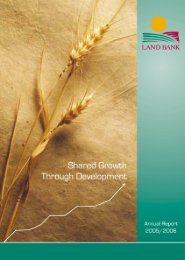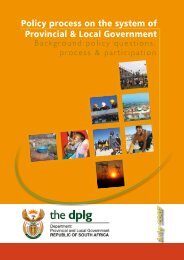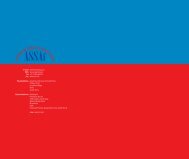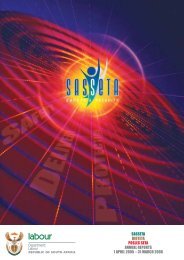Human Settlements Review - Parliamentary Monitoring Group
Human Settlements Review - Parliamentary Monitoring Group
Human Settlements Review - Parliamentary Monitoring Group
You also want an ePaper? Increase the reach of your titles
YUMPU automatically turns print PDFs into web optimized ePapers that Google loves.
<strong>Human</strong> <strong>Settlements</strong> <strong>Review</strong>, Volume 1, Number 1, 2010<br />
spiritual worlds which is an incommensurability<br />
of global knowledge systems.<br />
We can’t think that religion is ignorable.<br />
Many scientists and westerners have no<br />
inkling that humans have always counted<br />
less than the vast population of divinities and<br />
lesser transcendental entities that give us life<br />
(Latour, 2004: 456). Latour argues further<br />
that whenever cosmopolitanism has been<br />
tried out, such as for example by the United<br />
Nations, it has been during the great periods<br />
of complete confidence in the ability of reason<br />
and, later, science to know the one cosmos<br />
whose existence and solid certainty could then<br />
prop up all efforts to build the world metropolis<br />
of which we are all too happy to be citizens.<br />
The problem we face now is that it’s precisely<br />
this “one cosmos” or what Bruno Latour calls<br />
mononaturalism that has disappeared and<br />
therefore we need to abandon the beautiful<br />
idea of cosmopolitanism since we lack what<br />
our ancestors had, a cosmos (Latour: 2004:<br />
453)<br />
Society has always meant association and this<br />
has never been limited to humans. What is in<br />
question between us is the extent to which we<br />
are ready to absorb dissents not only about the<br />
identity of humans but also about the cosmos<br />
that we live in (Latour, 2004: 451). The ecophilosopher<br />
Joanna Macy throughout her work<br />
stresses the theme and need to reconcile false<br />
dichotomies and polarities. We need to expand<br />
our perspectives big enough to encompass<br />
both in new ways (Macy, 1991).<br />
For most people, in most places, during<br />
most eons, humans have “owners” to use<br />
Tobie Nathan’s terms and those proprietors<br />
take precedence over humans at whatever<br />
cost (Latour, 2004: 456). At international<br />
negotiations of the UN or UNESCO there<br />
are assumptions that humans of good will<br />
must agree that gods are no more than<br />
representations. Escobar (2008) argues that<br />
it would be pretty to think so but to some it is<br />
not humans who are at war but gods. Escobar<br />
(2008) argues that we should entertain the<br />
possibility that ‘enemies’ can be separated by<br />
disagreements that wide.<br />
Escobar argues that we need to decolonize<br />
knowledge as ways to decolonize nature and<br />
the land and natural resources (2008:12).<br />
The dominant western mechanistic views<br />
of nature that sees the universe as a dead<br />
machine is lacking in reverence for life and<br />
interconnections. The modern project of<br />
economic growth and domination of nature<br />
has gone badly awry and is threatening the<br />
living system of planet. The recent bombing of<br />
the moon in October 2009 by the United States<br />
in the name of science in order to discover<br />
whether there is water on the moon (while India<br />
had already discovered this) surely depicts<br />
that something has gone wrong in the name<br />
of science. Does this “reflect a prior disorder in<br />
thinking” (Orr, 2010:75) about humanity’s role<br />
in ecological systems We need to explore<br />
how better to integrate science and wisdom.<br />
Allan Kaplan states that because we have<br />
achieved so much success in our use of the<br />
material world which lies outside of ourselves,<br />
the way of thinking which supports such<br />
usage has come to be taken as the legitimate<br />
way of approaching the world. It has come<br />
to be taken as given. Yet simply because a<br />
particular way works with respect to certain<br />
135


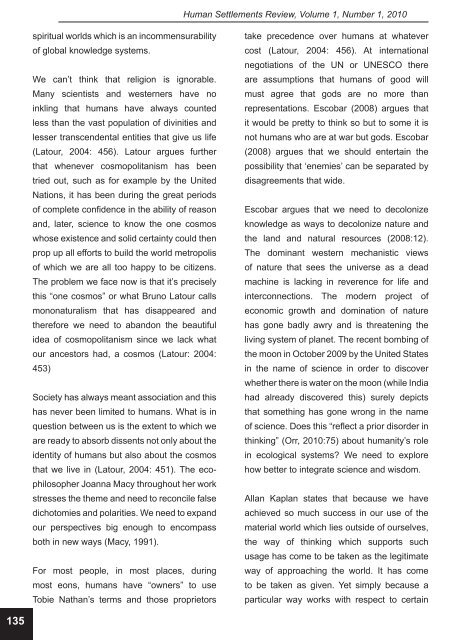
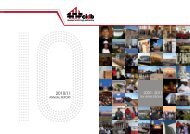
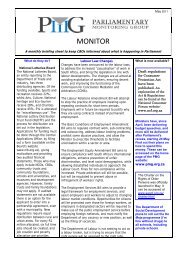
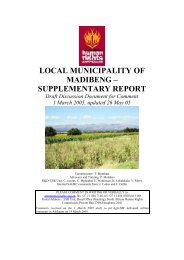
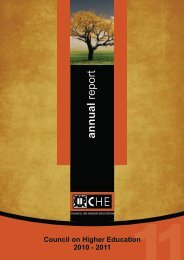
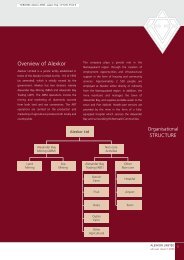
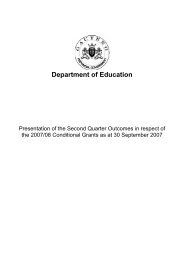
![National Research Foundation Annual Report 2008 / 2009 [Part 2]](https://img.yumpu.com/49774036/1/177x260/national-research-foundation-annual-report-2008-2009-part-2.jpg?quality=85)

